- Home
- James Axler
Iron Rage Page 10
Iron Rage Read online
Page 10
Ryan wasn’t much concerned by that talk. Somebody had ordered him chained up proper. You didn’t take that trouble with somebody you intended to murder out of hand. No matter how much hurt he’d laid on their comrades. And a pair of their armed patrol craft.
Granted, they might be saving him for some kind of excruciating torture later, but later was later. The key thing was that for now he was likely to be kept alive. The odds of his continued survival, minute to minute, were not much less than they had been every other moment of his long, eventful life. Even back in what he’d imagined to be the safe sanctuary of his father’s baronial mansion back in Front Royal.
“Bring him aboard.”
The cold, commanding voice came from the other boat.
As his awareness of his surroundings built back up, Ryan realized the vessel was now lying beam to beam with the one he’d ’jacked. He also realized with no little satisfaction that the return cannon shot that had taken him down had knocked the little cannon on the foredeck onto its side. It hadn’t so much as dented it, that he could see. That didn’t surprise him. Cannon had to be cast tough. And yet, for all the massive damage they could deal wood—or flimsy human flesh—they were fairly low-powered. It was why it only took a relatively light sheathing of scavvied plates to shrug off cannonballs.
He also realized, only a heartbeat tardy or two, that the voice was feminine.
A woman stood inside the rail of the other ship, trim and blaster-barrel rigid, though she looked no higher than Ryan’s own shoulder. Her face was dark-skinned beneath her billed cap, which sported enough yellow bird-poop decoration to indicate rank, even if he couldn’t read which one. He guessed it wasn’t exalted, even if the black officer had command of the whole mess of little patrol boats.
But her expression, like her posture and her voice, left no doubt that she held the highest rank here.
“Get him aboard,” she ordered. “And don’t ding him. Not even a bruise or a scratch that he doesn’t have already. His sorry ass is still more valuable to the fleet than yours is, for now.”
“But why, Lieutenant?” one of the men holding Ryan’s arms from behind whined.
“Because I said so.”
Ryan felt his captor brace. “Sir, yes, sir!”
“When one man lays that much hurt on us,” the lieutenant said, “intel is going to want a word with him. The baron might take an interest. Handle him accordingly.”
The faces that had been turned toward Ryan were now all turned toward her. The anger and hate had all gone out of their postures.
“Shouldn’t we hood him proper?” another one of Ryan’s guards asked.
“Bring him aboard,” the woman said. “Let him help get himself across. And you—”
She fixed the full force of her glare on Ryan. It was a pretty fair forceful glare, although it fell miles short of intimidating him. Then again, almost nothing on Earth ever did.
“If you act up or don’t do your part, I give my crew permission to give you a couple of brisk butt strokes to your kidneys, so that you will be pissing blood up until the time it pleases the Baron Tanya Krakowitz of New Vickville you hang from the yardarm of the Pearl. Do I make myself clear?”
“Clear as glass,” he said.
Ryan hadn’t given his captors any trouble. He had stepped aboard the other ship as carefully as he could and submitted meekly when they stuffed a black cloth bag over his head and cinched it beneath his chin. It was coarse enough to let him breathe but not enough to let him see anything. There was plenty of play around his neck, as nobody cared to face the consequences of delivering a choked-out chill to his baron.
When the bag was finally removed, the person upon whom his eye finally focused was probably not Baron Tanya. Most likely she was another officer, this one as tall as Krysty, as trimly upright as the other, and her uniform as well turned out. Unlike the other, who had her hair hidden beneath her cap if she even had any, this woman left her severe blond bun uncovered. She was also young, fine-looking despite the professionally severe expression. Her posture, with her long, slender legs braced and her hands behind her back, was that of a person in charge here, not a person in charge overall. A baron’s kid grew up knowing the difference almost by instinct.
“Who are you?” she asked. The footfall was cushioned by what seemed likely to be some kind of rug. The blonde officer clearly hadn’t done it. And anyway a person in her position, whatever it precisely was, didn’t pull the hoods off captives still reeking of gore and black powder—mostly other people’s—herself.
“My name’s Ryan Cawdor,” he said. As a general rule he didn’t like lying more than necessary. A person could easily be tripped up. And while he was reluctant to cede anything to an enemy, he also didn’t see how knowing his name would help them. He cast his eye around the room. It was opulently furnished, with well-stuffed chairs and lanterns masquerading as fancy fixtures, and a series of paintings of various sizes adorned the walls. Most portrayed Greek gods, with very few goddesses among them, or clothes. The furniture, dark finished wood and dark green velvet upholstery, looked sturdy and well-made. Then again, it wasn’t as if woodworking was some lost high-tech predark skill. The existence of this ship and her sisters, both large and small, gave testimony to that. Woodworking was a skill that survived the ages. When the world blew up, it became a very useful craft indeed, and as hardscrabble-poor as the world and its individual tribes and villes wound up, one that there was almost always a decent living to be had by following. So it survived, even where reading and other forms of conventional learning had not.
It was news he could use. Maybe.
The surroundings obviously belonged not just to somebody with the wealth and power to set them up and maintain them—or have those things done—but somebody who was squared away and cared about details. As opposed to a slovenly, drunk-ass brute of a baron—the far more commonplace kind. It was a stateroom belonging to the sort of baron it would take, say, to muster a battle fleet that was both massive and massively armed by Deathlands standards, and boss them in battle. Even if you fell backward into the job—inheriting from your dead baron husband.
“You have the advantage over me,” he said to the officer.
She looked blank for a moment. Then she smiled, though not in any yielding way.
“I’m Flag Lieutenant Ellin Stone,” she said.
“Why am I here?”
She didn’t play any “I ask the questions here” games. She straightaway said, “You’re awaiting the baron’s pleasure. She wants to know how a single man could wreak so much havoc among her patrol personnel. And vessels.”
That lack of overt bullying suggested she was comfortable in her, and her boss’s, seemingly unassailable grasp on the upper hand. Her comfort was not unwarranted—right then. Ryan’s wrists had been unchained when he was brought aboard the bigger ship. But his hands had been tied, as well as his ankles, once he was deposited in the chair. And a boat crew knew knots the way J. B. Dix knew blasters. He wasn’t getting free on his own.
At least they were more comfortable than the shackles, although the ropes chafed his wrists some.
“Anybody can get lucky, once in a while,” he said.
She scoffed. “I wouldn’t try that line on the baron, Mr. Cawdor. She is no fool. Nor is she an empty-headed former gaudy slut who caught an older baron’s eye, no matter what your employers may have told you.”
“Why would my employers tell me something like that?”
She frowned. “Poteetville. You work for them, don’t you?”
“You mean the bunch with the other fleet of nuking big ships with scrap iron bolted all over them?”
Her frown deepened at that description. He suspected her duties were more involved with waiting on the baron as an aide than nautical matters. But she still clearly felt pride in the New Vick fleet.
He shook his head. He had meant to dent her composure, and had.
“I don’t work for them.”
“
Who does employ you, then? You’re a mercie, right?”
Time to lie. He had already worked it out in advance. The lie was one the lieutenant and her baron would be predisposed to believe, so they weren’t likely to question it.
Not that it was even that big a lie, much as he hated to admit it to himself.
He nodded. “Nobody you’d know. A trading ship down off the Yazoo, a tugboat hauling a big barge loaded with wood and cloth. Or were.”
“Ah. The barge that burned between our fleets.”
“That’s the one.”
“What were you doing out there tonight, then?”
“The tug got blown to nuke by cannon from both sides,” he said. “We managed to get in close to shore before it sank and hid in the weeds along the Sippi while the two sides sorted things out between them.”
He didn’t know the details of how that worked out, of course. But he reckoned Stone did, and would feel no need to ask.
“We spent the next couple days salvaging what timber we could from the hulk, then cobbled it together into a few rafts and tried sneaking south past your fleet.”
Stone cocked a finely arched brow at him. “Evidently you didn’t expect our patrols to be so alert.”
Evidently we didn’t reckon our luck would go so far south so fast, he thought. If they were triple alert, they had a nuking peculiar way of showing it.
He shrugged. “Evidently.”
“You seem…well-spoken for a man in your…profession.”
Professional coldheart, you mean, Ryan thought.
“Let’s say I didn’t always do what I do now.”
“So tell me, then, Ryan Cawdor,” a husky female voice said from behind, “what possessed a mercie to single-handedly attack one of my blasterboats while your employers turned tail and scuttled for safety?”
Chapter Eleven
Ryan craned his head around as heavy heels tapped on the deck. The rugs beneath muffled the sound but didn’t eliminate it.
“Baron Vickville, I presume,” he said.
“The same.”
When the same cloying floral essence he’d been breathing in through the bag over his head the past hour—which was admittedly an improvement over stale former-captive saliva—got abruptly much stronger, right before the hood came off, he hadn’t needed more clues to follow the plot.
He also reckoned she hadn’t pulled the bag off his head, any more than her high-assed assistant had. As she almost at once confirmed.
“You may leave us now, Dogbert,” she said grandly.
“Yes, ma’am,” a subservient male voice said. The heavy oak door to the stateroom opened and closed.
“You and the lieutenant aren’t afraid of being alone with a dirty, desperate mercie?” he asked.
She laughed, a quick, deep sound.
“I find myself beset by enemies on every side,” she said. “Not just that tin-sword Napoleon, Baron Harvey Poteet. But my own magnates who are supposed to be the staunch upholders of New Vickville. They claim I am nothing but a usurper, and seek every excuse and opportunity to pull me down. Do you think if I didn’t trust myself, not to mention the exceedingly competent Lieutenant Stone and her sidearm, to keep me safe from a mercie, however desperate, however dirty, who also happens to be bound hand and foot, that I’d have kept the barony as long as I have?”
“Aren’t you running a risk telling me that kind of thing?”
This time her laugh was full-throated.
“If I should decide such knowledge in your possession might pose a danger to me,” she said, “it and you can go over the side, triple easy, with five hundred pounds of ballast tied to you.”
She took her place across the room and a low table from him in what he suspected was the grandest chair, and crossed one plump leg over another.
“Now, Mr. Cawdor,” she said, “perhaps you can enlighten me as to how a landless vagabond coldheart such as yourself happened to nearly write off two of my patrol boats and somewhere upward of a dozen of my officers and crew? We don’t even know the total butcher’s bill yet. And I shall reiterate my earlier question—once. Why?”
“It’s my job. I get paid to do it. And I’m very good at what I do.”
“That much seems obvious.”
He was sizing her up, now that he could do more than infer her presence by smell. She was on the goodly side of medium height, a couple inches shorter than Krysty, allowing for the short, dark blond hair pomaded into sort of a low crest on top of her head. She wore a velvet jacket and pants that matched the upholstery, and may have been made of the same cloth, over a yellow blouse with a ruffled front and low-heeled black half boots. It struck him as being as practical as it was swank and comfy. She could move in it if she had to. She was definitely bigger around the middle than at the ends. But she was nowhere in the grossly obese category of other barons he had encountered—Jordan Teague came to mind. Nor did she appear to be the sadistic slob he had been. Still, he judged she had never been a lightweight, not even of the well-muscled kind Stone’s well-tailored uniform revealed her to be. The late baron had to have favored a sturdy woman.
She did strike him, pampered baron or not, former gaudy slut or not, as a woman who packed a mean punch. And knew how to deliver one. If she did turn out to be sadistic, he reckoned she’d be anything but sloppy at it.
Some might consider her to be a handsome woman, if decidedly overly caked and rouged. Her eyes were probably large and green enough—darker than Krysty’s—not to need the green paint she’d surrounded them with. Her painted lips seemed to settle into a smile that was neither cruel nor smirking, though he also would never mistake her for gentle. Or soft.
“So you did your job,” she said. “And you do appear to be good at it indeed. But why in that way?”
“Your boats had us dead to rights. They could blow us all out of the water in half a second, with nothing we could do about it. And we already noticed how quick on the trigger your people were.”
“Think of it as the predator’s reflex,” she said. “If the prey runs, they pounce.”
“Yeah. Well. They struck me as already primed to pounce, with nothing else required. You know how they say to run away from a knife, but charge a blaster?”
She nodded. “Generally sound advice, I find, too,” she murmured.
“Well, I calculated that a cannon is nothing but a big blaster. So I decided to charge.”
“And after your employers ran off and left you to die?”
He uttered a wolf grunt of a laugh. “I didn’t think your crew would be in any hurry to embrace me,” he said, “seeing as I already chilled a couple of them to open our acquaintance. So I decided it was do-or-die.”
“So you weren’t trying to cover their escape?”
He laughed at that. “Theirs? I was trying to pull off my own.”
She actually goggled at him. She looked to her aide, who stood not far from her right shoulder, just beyond a round table with a silver tray holding a cut-crystal decanter and several glasses. Stone shook her head.
“Are you suggesting, Mr. Cawdor,” the baron said, looking back at him, “that you intended to hijack the Yarville and use it to make your getaway?”
“I did hijack it, Baron. It was the getting-away part where I ran into difficulty.”
She stared at him. After an increasingly uncomfortable interval he began to wonder if he’d overplayed his hand. Then again, it wasn’t as if he had much to lose, under the circumstances.
Then she started laughing.
He didn’t join in. He didn’t feel that faking his way along with her would help his cause. Baron Tanya was shaping up as a person who liked a man hard enough to maintain a cool attitude in his position—not defiant, necessarily, but the opposite of servile. And wherever his best shot at getting back to his friends and getting them out of this mess lay, aiming for Dogbert’s job as butler was triple sure not it.
“I like you, Cawdor,” she said. “You’re my kind of asshole.”
> She uncrossed her legs and sat forward, putting her hands on her meaty, green-clad thighs.
“Come work for me.”
“Why?” he asked warily.
“You’re a mercie. I pay well for value.”
“I mean, why would you offer me a job, instead of a bullet in the head? Or a quick trip to the bottom of the Sippi. I chilled a bunch of your people and messed up your boats.”
Her dark green eyes met his steadily. “Their job is to die for New Vickville,” she said. “If necessary. But their main job was to control the situation, not to get overrun by a one-man army. I don’t feel good about the dead and wounded, but I don’t blame you. You faced a threat, and you responded, which was better than two boatloads of my sailors did.”
He sat back and looked at her. The persona he was choosing to present would be skeptical of the baron’s apparent readiness to forgive, and would be shrewd enough to look over an offer to see if it sounded too good to be true—and if it did, to know that it was.
“You’re dubious,” she said.
“I’d be triple stupe not to be, wouldn’t I, Baron?”
He glanced briefly at Stone. She stood by watching with a stern expression that he guessed amounted to neutral. Maybe she put it on and took it off with her snappy blue-green uniform. Maybe she didn’t. But she wasn’t giving away her own assessment of him or the situation for glowing nuke shit.
Fair enough. There was one boss in this room, and it wasn’t her, as he had calculated all along. She might have influence over her baron, but Tanya Krakowitz was clearly headstrong, and inclined to make up her own mind.
The baron stood again.
“Here’s how I see it,” she said. “I think you laid your ass on the line for your former bosses. You could’ve started hollering surrender, or just dived in the river and swum for the shore.”
Not with those bastard crocs in there, he thought. Although he didn’t for a fact know if they inhabited this stretch of the big river, or merely stayed up Wolf Creek, for whatever obscure reason. He was too battered and wily to say anything that might expose his companions’ hiding place. “So you went on the attack—” she was clearly warming to her narrative “—because, as you say, you thought it was the best way to do your job. Then your employers cut stick and ran off on you. And you single-handedly set out to whip two blasterboats full of crew and came close to doing it.

 End Program
End Program Nemesis
Nemesis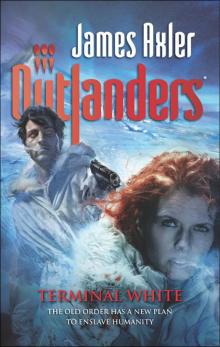 Terminal White
Terminal White Homeward Bound d-5
Homeward Bound d-5 Blood Harvest (v5)
Blood Harvest (v5) Amazon Gate
Amazon Gate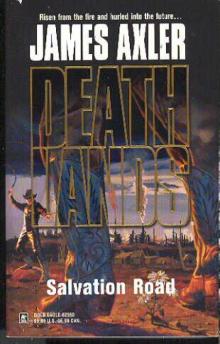 Salvation Road
Salvation Road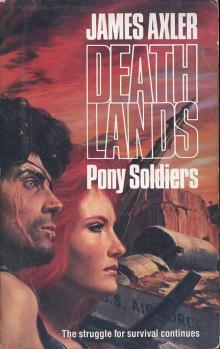 Pony Soldiers
Pony Soldiers Blood Harvest
Blood Harvest Atlantis Reprise
Atlantis Reprise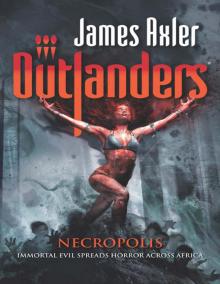 Necropolis
Necropolis Haven's Blight
Haven's Blight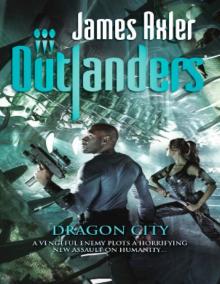 Dragon City
Dragon City Crater Lake
Crater Lake Storm Breakers
Storm Breakers Moon Fate
Moon Fate Eden’s Twilight
Eden’s Twilight Savage Armada
Savage Armada Desolation Crossing
Desolation Crossing Time Nomads
Time Nomads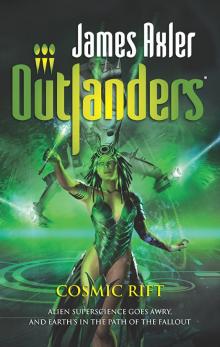 Cosmic Rift
Cosmic Rift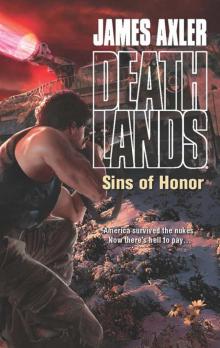 Sins of Honor
Sins of Honor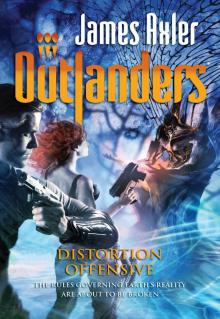 Distortion Offensive
Distortion Offensive Arcadian's Asylum
Arcadian's Asylum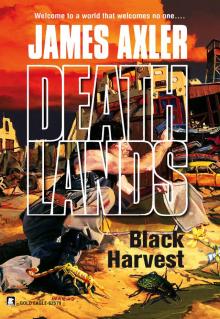 Black Harvest
Black Harvest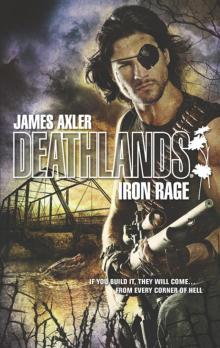 Iron Rage
Iron Rage Nightmare Passage
Nightmare Passage Labyrinth
Labyrinth Child of Slaughter
Child of Slaughter Cannibal Moon
Cannibal Moon Tainted Cascade
Tainted Cascade Ritual Chill
Ritual Chill Sunchild
Sunchild Wretched Earth
Wretched Earth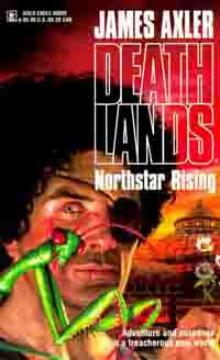 Northstar Rising d-10
Northstar Rising d-10 Damnation Road Show
Damnation Road Show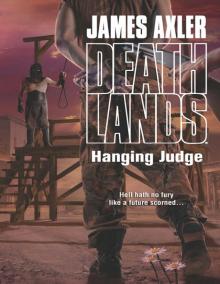 Hanging Judge
Hanging Judge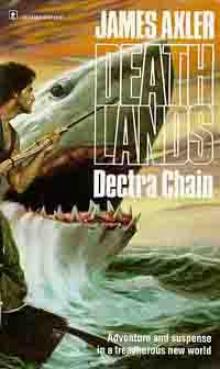 Dectra Chain d-7
Dectra Chain d-7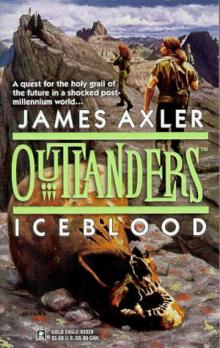 Iceblood
Iceblood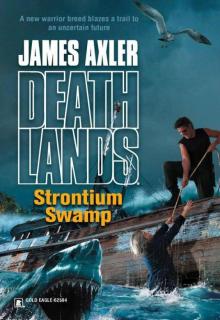 Deathlands 074: Strontium Swamp
Deathlands 074: Strontium Swamp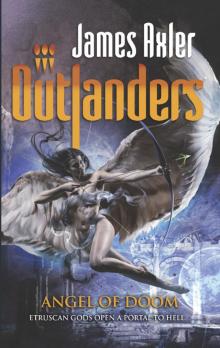 Angel of Doom
Angel of Doom Sunspot
Sunspot Ice and Fire d-8
Ice and Fire d-8 Pilgrimage to Hell d-1
Pilgrimage to Hell d-1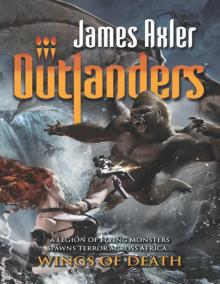 Wings of Death
Wings of Death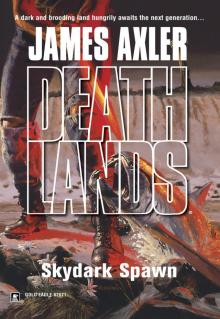 Skydark Spawn
Skydark Spawn Neutron Solstice d-3
Neutron Solstice d-3 Deathlands 067: Death Hunt
Deathlands 067: Death Hunt Pilgrimage to Hell
Pilgrimage to Hell Siren Song
Siren Song Perdition Valley
Perdition Valley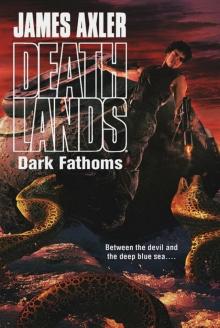 Dark Fathoms
Dark Fathoms Remember Tomorrow
Remember Tomorrow Crucible of Time
Crucible of Time Savage Armada - Deathlands 53
Savage Armada - Deathlands 53 Judas Strike - Deathlands 54
Judas Strike - Deathlands 54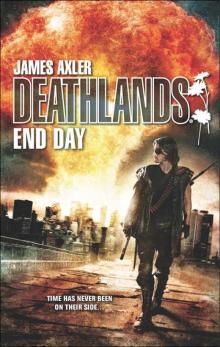 End Day
End Day Dark Resurrection
Dark Resurrection Deathlands - The Twilight Children
Deathlands - The Twilight Children Deathlands 068: Shaking Earth
Deathlands 068: Shaking Earth Breakthrough
Breakthrough Death Hunt
Death Hunt Perception Fault
Perception Fault Red Equinox
Red Equinox Motherlode
Motherlode Deathlands 071: Ritual Chill
Deathlands 071: Ritual Chill Hell Road Warriors
Hell Road Warriors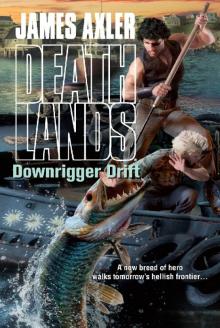 Downrigger Drift
Downrigger Drift Gaia's Demise
Gaia's Demise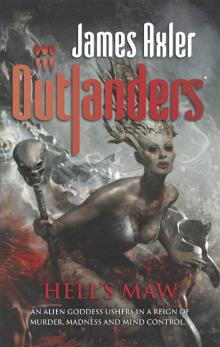 Hell's Maw
Hell's Maw Devil's Vortex
Devil's Vortex Prodigal's Return
Prodigal's Return Deathlands 122: Forbidden Trespass
Deathlands 122: Forbidden Trespass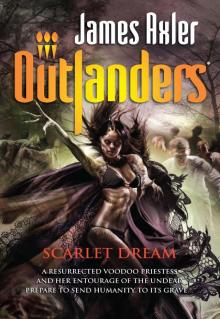 Scarlet Dream
Scarlet Dream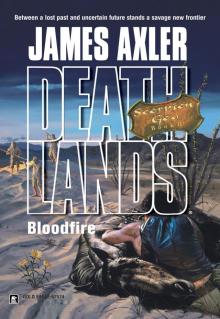 Bloodfire
Bloodfire Plague Lords (Empire of Xibalba, #1)
Plague Lords (Empire of Xibalba, #1) Moonfeast
Moonfeast Latitude Zero
Latitude Zero Lost Gates
Lost Gates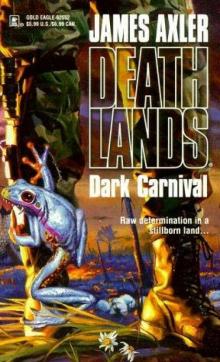 Dark Carnival
Dark Carnival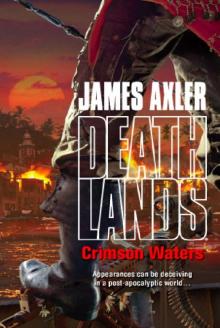 Crimson Waters
Crimson Waters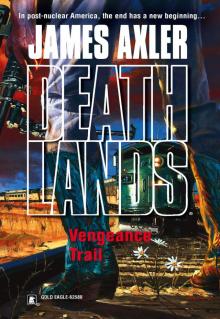 Vengeance Trail
Vengeance Trail Apocalypse Unborn
Apocalypse Unborn Doom Helix
Doom Helix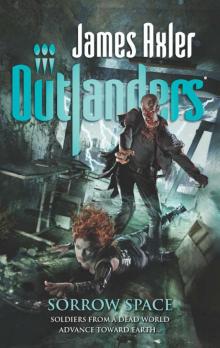 Sorrow Space
Sorrow Space Separation
Separation Northstar Rising
Northstar Rising Red Holocaust
Red Holocaust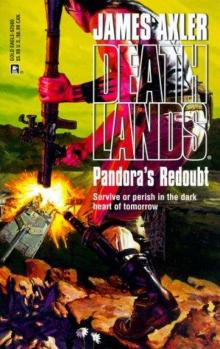 Pandora's Redoubt
Pandora's Redoubt Chill Factor
Chill Factor Prophecy
Prophecy Crater Lake d-4
Crater Lake d-4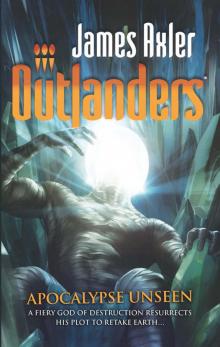 Apocalypse Unseen
Apocalypse Unseen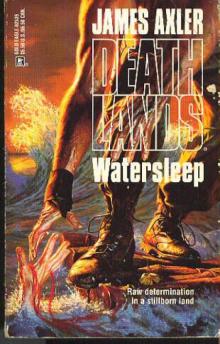 Watersleep
Watersleep Judas Strike
Judas Strike Time Castaways
Time Castaways Baptism of Rage
Baptism of Rage Polestar Omega
Polestar Omega Red Holocaust d-2
Red Holocaust d-2 Outlanders 15 - Doom Dynasty
Outlanders 15 - Doom Dynasty Way of the Wolf
Way of the Wolf Deathlands 075: Shatter Zone
Deathlands 075: Shatter Zone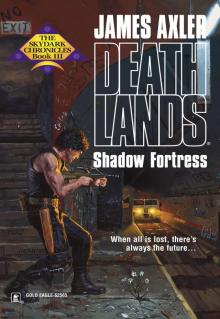 Shadow Fortress
Shadow Fortress Outlander 05 - Parallax Red
Outlander 05 - Parallax Red Shaking Earth
Shaking Earth Playfair's Axiom
Playfair's Axiom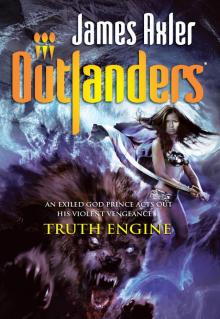 Truth Engine
Truth Engine Homeward Bound
Homeward Bound Desert Kings
Desert Kings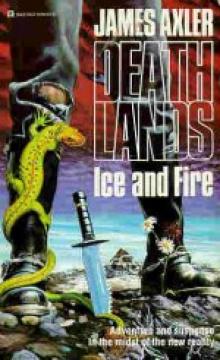 Ice and Fire
Ice and Fire Zero City
Zero City Palaces of Light
Palaces of Light No Man's Land
No Man's Land Neutron Solstice
Neutron Solstice Devil Riders
Devil Riders Thunder Road
Thunder Road Deathlands 118: Blood Red Tide
Deathlands 118: Blood Red Tide Deathlands 114: Siren Song
Deathlands 114: Siren Song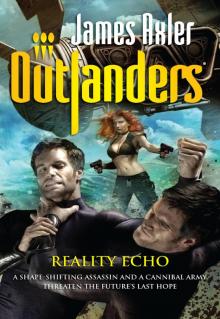 Reality Echo
Reality Echo Hive Invasion
Hive Invasion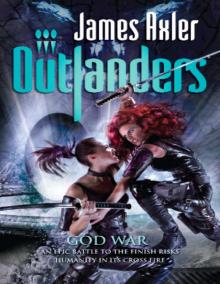 God War
God War Chrono Spasm
Chrono Spasm Judgment Plague
Judgment Plague Blood Red Tide
Blood Red Tide Dectra Chain
Dectra Chain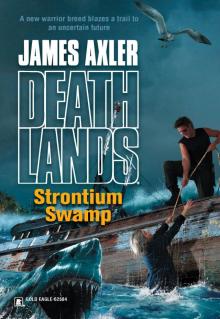 Strontium Swamp
Strontium Swamp Seedling
Seedling Shatter Zone
Shatter Zone Hellbenders
Hellbenders